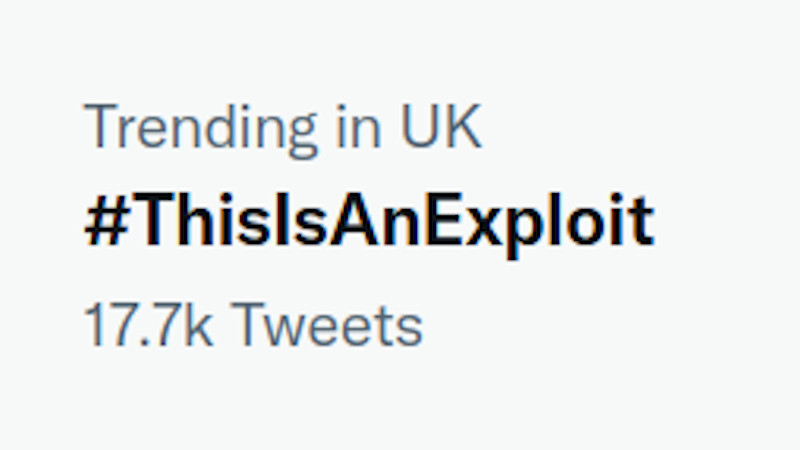If you have ever taken to Twitter to gauge the zeitgeist, you’ll have noticed that among the trending hashtags related to major events of the day there are sometimes outliers of minority interest associated with single-issue causes. When a cause with a distasteful pedigree was cited one as proof of widespread public support in a debate in the UK’s House of Lords there were concerns raised that a flaw in the ranking algorithm might be responsible, and it was left to [Mallory Moore] to prove the hypothesis by getting a #ThisIsAnExploit hashtag trending without a groundswell of popular support.
Some previous detective work had established that equal ranking might be awarded equally not simply for Tweeting a hashtag but also for retweeting it. The exploit takes advantage of this by means of a relatively small cadre of people all Tweeting the tag a number of times, then retweeting all other instances of it. The resulting rank gain is then in the order of the square of the number of accounts interacting with the tag, and thus hugely inflated over the number of real participants. To test this she created the #ThisIsAnExploit tag and asked her followers to do just that: Tweet it and retweet all others containing it. In a short time the exploit succeeded, beating a very high-profile tag associated with the travails of the British Prime Minister in the process, and with most of the effort due to only 50 accounts.
Our world is now significantly influenced by social media because for many it appears more trustworthy than the old-style mass media with a print origin. Work like this is important because a reminder that transferring the message from newspaper proprietors to tech barons does not confer credibility is sorely needed. Meanwhile now the weakness is in the wild we wonder how Hackaday readers might have fun with it. Does anyone want to see a #RaiseTheJollyWrencher hashtag top the pile?
















Twitter is absolutely a game-able platform, but I didn’t suspect it’s that bad until I saw how quickly this hashtag could rise to prominence. If gaming the sidebar is that easy (and might remain as easy, who knows), what else is there to use? Explains all the obscure too-online political hashtags I’ve seen in the sidebar (thank god for twemex).
Makes me wonder – just how should I actually use hashtags? Only used them meaningfully for cataloging a tweet series (#HackadayGems) so far. Certainly, doing it like #some #people #do can’t be meaningful… now, can it?
I have to say i don’t use them that often. But I suspect my social media usage would never make me an influencer.
Now I’d be really cross at them if they managed to save Boris’s ass with that.
It’s relatively easy to prove what is falsely inflated once you know the trick.
And this is a fine place to share that proof by revealing the trick.
Let’s not falsely inflate Boris’s arse though.
I’m afraid I can’t find the actual research on this at the moment, so this is mostly anecdotal, but it’s been fairly obvious for a while that most of the hashtags trending on the Turkish language Twitter had been manipulated in one way or another. I believe another method used was stolen accounts, however the individuals stealing these accounts didn’t lock their owners out of their accounts, so these accounts were also posting legitimate tweets at the same time. It turns out, the Twitter algorithm includes tweets in trends even if they are later deleted, so you can use stolen accounts to boost a hashtag and delete the offending tweet before the real owner figures out what is going on.
I believe you all are offering misinformation, not following the infallible SCIENCE unquestioningly, and therefore you are all banned!
FWIW – I have no idea what the prime minister is doing/not doing and leave it to the people of Great Brittan to decide. I don’t use any “social media” (anti-social media?) but one of the “scientific theories” I have yet to see disproven is GIGO – garbage in – garbage out. It is not surprising to me that a giant marketing company is “dishonest”, it is surprising that it survives and thrives. Why?
If you disagree with any of my statements you are not only permited to continue to exist, but are encouraged to present differing opinions.
disclaimer: the thoughts and opinions posted in this reply are the opinions of this author and in no way representative of whatever, etc.etc.yada..
That’s it. You’re banned from Spotify now!
🤣
It used to be true that social media gave you a less filtered, on-the-ground perspective on current events, but the bad actors have caught up with this, and now the platforms are highly manipulated by both internal and external forces. We’re back to square one again I’m afraid. You have to do research and try to pick apart the truth from the lies, just like its always been I guess.
We never moved away from square one. There’s an old German proverb: “Wes Brot ich ess, des Lied ich sing.” (rough translation: who pays the piper calls the tune.)
Twitter is gold for infosec. You just have to select who to follow and since so many infosec professionals are on twitter the false prophets don’t get a foot between the door and are easily exposed.
The real infosec professionals are not on Twitter, just like the good lawyers do not advertise on bus shelters. The good ones have plenty of work to do without needing to advertise, and they’re far too busy working to splash around in the sewer that is social media.